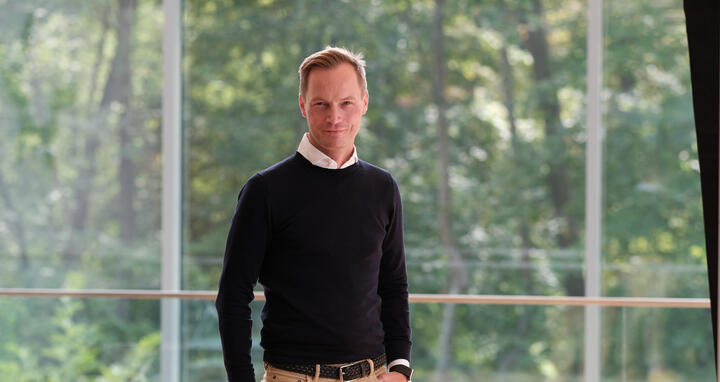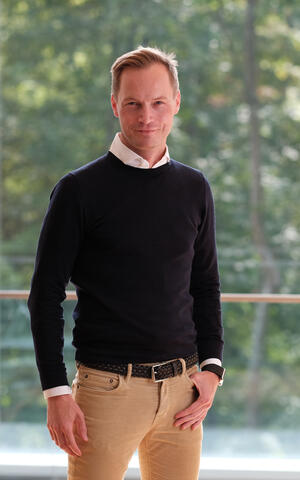Michael Potente to strengthen vascular research
Michael Potente
“Cardiovascular diseases are still one of the most frequent causes of illness and death,” says Prof. Axel Radlach Pries, Dean of Charité and interim Chairman of the BIH Executive Board. “Since changes in vascular function are a factor in many diseases, the BIH decided some time ago to establish a Translational Vascular Biomedicine focus area in order to achieve significant progress and translational success in this field. We are delighted to be able to complement and expand upon this research in such an outstanding way with the appointment of Michael Potente.”
Michael Potente has visited Berlin regularly since 2017 as a BIH Visiting Professor, funded by Stiftung Charité. He was invited by BIH Professor Holger Gerhardt, who heads the Integrative Vascular Biology Lab at the MDC and is also spokesperson for the Translational Vascular Biomedicine focus area at the BIH. “I know very few scientists like Michael Potente who carry out innovative research at the highest level with such enthusiasm, curiosity, and a keen sense of the most important issues,” says Gerhardt. “His work is constantly uncovering new connections and has a lasting impact on our understanding of the fascinating biology of blood vessels. I am hugely looking forward to working with him to further advance the translation of these findings into clinical practice.” The 43-year-old Michael Potente will conduct research at the BIH and MDC’s Käthe Beutler Building on the Berlin-Buch campus.
Understanding the growth and function of blood vessels
Michael Potente is mainly interested in the influence of metabolism on blood vessels. “We want to understand how metabolic processes control the growth, remodeling and function of blood vessels,” explains Potente, who currently heads the Angiogenesis and Metabolism Laboratory at the Max Planck Institute for Heart and Lung Research in Bad Nauheim. For example, a lack of oxygen and nutrients can lead to the formation of new blood vessels (a process known as angiogenesis) in tumors. Angiogenesis also plays a central role in eye diseases like wet macular degeneration, which leads to blindness if left untreated. “In this case, therapeutic interventions are already possible thanks to the use of inhibitors that suppress the abnormal growth of the blood vessels,” reports Potente.
However, in other diseases, such as chronic ischemic heart disease or peripheral artery disease in the legs, blocked blood vessels still cause a lack of oxygen and nutrients to reach the tissue, but unfortunately this often does not lead to the sufficient formation of new blood vessels. “We would hope for new, functional vessels to grow that would restore the supply – but here, the underlying disease prevents that from happening,” explains Potente. “If it were possible to specifically promote the growth of new blood vessels, this would have great therapeutic value.” Unfortunately, previous attempts to do so have not achieved long-term success, and have instead resulted in side effects.
Differing endothelia in different organs
Potente and his colleagues therefore hope to understand how the organ-specific environment affects blood vessels – particularly the endothelium. Endothelial cells are responsible for the formation of new blood vessels. "Endothelial cells have a completely different configuration in different organs," said Potente. "In the brain, for example, they are particularly closely connected to each other and form the blood-brain barrier; in the liver, the endothelium is permeable and thus enables the organ's filtering function.” In diabetics whose blood sugar levels are constantly above normal, endothelial cells change over time and lose specific properties, which leads to the frequent vascular problems associated with this disease.
In order to discover the molecular and cellular mechanisms behind these differences, Potente was awarded a €2 million ERC Consolidator Grant from the European Research Council in 2017. It was also at this time that he came to Berlin regularly as a BIH Visiting Professor. The Stiftung Charité has promoted this collaboration, which has been fundamental for the appointment, in the course of its Private Excellence Initiative Johanna Quandt.
The aesthetics of blood vessels
As a cardiology specialist, Michael Potente is also active on the clinical side. In Berlin, he hopes to contribute his experience working at the interface between basic research and patient care – and thus strengthen the focus on translational vascular biomedicine. “I am fascinated by the aesthetics of blood vessels, the advancement of scientific knowledge and, ultimately, the possibility of one day making basic research applicable in the diagnosis and treatment of disease.” This is a sentiment fully in line with the BIH’s mission of turning research into health. Michael Potente was born in Aachen in 1976 and studied medicine at Goethe University Frankfurt and the University of Toronto. Already in the course of his experimental doctoral thesis at Goethe University Frankfurt, which he completed in 2003, he conducted research into blood vessels. He then worked both as a postdoctoral research at the Institute of Cardiovascular Regeneration and as a physician in the Department of Cardiology of Goethe University Frankfurt, where he qualified as a professor in the field of internal medicine in 2013. In 2012 he established his own research group at the Max Planck Institute for Heart and Lung Research in Bad Nauheim. Potente has already received numerous awards and grants, including an ERC Starting Grant, an ERC Consolidator Grant and the distinction as a European Molecular Biology Organization (EMBO) Young Investigator. He has published his research in distinguished journals and serves as an expert reviewer for numerous international scientific journals.
Joint press release from BIH, Charité and MDC
Text: Stefanie Seltmann, BIH
Further information
Contacts
Jutta Kramm
Head of the Communications Department
Max Delbrück Center for Molecular Medicine in the Helmholtz Association (MDC)
+49(0)30-9406-2140
jutta.kramm@mdc-berlin.de
Dr. Stefanie Seltmann
Head of Communication & Marketing Berlin Institute of Health
+49 (0)30 450 543 019
s.seltmann@bihealth.de
The Berlin Institute of Health (BIH)
The Berlin Institute of Health (BIH) is a biomedical research institution focusing on translational research and precision medicine. The BIH is dedicated to improving the prediction in progressive diseases and developing advanced therapies for unmet medical needs in order to improve patients’ health and quality of life. The Institute is committed to providing research solutions and innovation enabling value-based, personalized healthcare. The BIH is funded 90% by the Federal Ministry of Education and Research (BMBF) and 10% by the State of Berlin. The two founding institutions, Charité – Universitätsmedizin Berlin and Max Delbrück Center for Molecular Medicine in the Helmholtz Association (MDC), are independent, member entities within the BIH.
- The Max Delbrück Center for Molecular Medicine (MDC)
-
The Max Delbrück Center for Molecular Medicine in the Helmholtz Association (MDC) is one of the world’s leading biomedical research institutions. Max Delbrück, a Berlin native, was a Nobel laureate and one of the founders of molecular biology. At the MDC’s locations in Berlin-Buch and Mitte, researchers from some 60 countries analyze the human system – investigating the biological foundations of life from its most elementary building blocks to systems-wide mechanisms. By understanding what regulates or disrupts the dynamic equilibrium in a cell, an organ, or the entire body, we can prevent diseases, diagnose them earlier, and stop their progression with tailored therapies. Patients should benefit as soon as possible from basic research discoveries. The MDC therefore supports spin-off creation and participates in collaborative networks. It works in close partnership with Charité – Universitätsmedizin Berlin in the jointly run Experimental and Clinical Research Center (ECRC), the Berlin Institute of Health (BIH) at Charité, and the German Center for Cardiovascular Research (DZHK). Founded in 1992, the MDC today employs 1,600 people and is funded 90 percent by the German federal government and 10 percent by the State of Berlin.
Charité – Universitätsmedizin Berlin
Charité – Universitätsmedizin Berlin is one of the largest university hospitals in Europe, boasting 3,099 beds and approximately 100 departments and institutes spread across 4 separate campuses. At Charité, the areas of research, teaching and medical care are closely interlinked. With a total of 20,921 members of staff employed across its group of companies (17,615 of which at Charité), the organization is one of the largest employers in Berlin. 5,047 of its employees work in the field of nursing, with a further 4,988 in research and medical care. Last year, Charité treated 123,793 in- and day case patients, in addition to 682,731 outpatients. In 2021, Charité recorded a turnover of approximately € 2.3 billion (including external funding and investment grants) and set a new record by securing more than € 215.8 million in external funding. Charité’s Medical Faculty is one of the largest in Germany, educating and training more than 9,000 students across the subjects of medicine, dentistry, health sciences and nursing. Charité also offers 730 training positions across 11 different health care professions, in addition to 111 training positions in a further 8 professions. Within the field of academic medicine, Charité’s priorities are highlighted by its main areas of research focus: infection; inflammation and immunity including COVID-19 research; cardiovascular research and metabolism; neuroscience; oncology; regenerative therapies; and rare diseases and genetics. Examples of the work conducted by Charité researchers include involvement in 28 DFG Collaborative Research Centers (of which seven are led by Charité), three Clusters of Excellence (of which one is led by Charité), 10 Emmy Noether Independent Junior Research Groups, 14 European Research Council grants and 8 European collaborative projects (coordinated by Charité).
As of June 1, 2022





